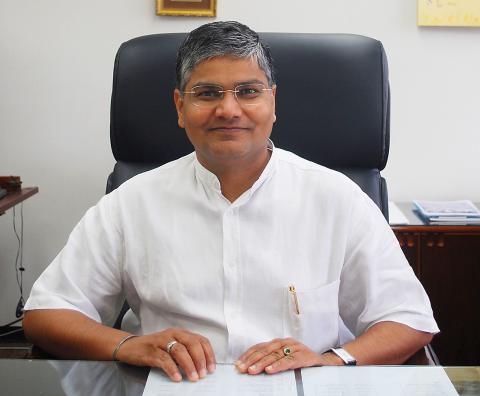|
FEATURE: Diplomat embraces urbanite
life
By Nancy Liu / CNA, with Staff Writer

Pradeep Kumar Rawat,
director-general of the India-Taipei Association, poses for a picture yesterday.
Photo: CNA
Most people would agree that working in
big cities can be a recipe for tension and frustration, but for those equipped
with stress management skills, urban living can still be an enjoyable
experience.
Just ask Pradeep Kumar Rawat. The Indian diplomat, who lives in bustling Taipei,
loves city life, but has found simple formulas help to keep stress levels down.
¡§Whenever free, I take a walk in the Sun Yat-sen Memorial Hall next to my
apartment to enjoy the wonderful ambiance,¡¨ he said in a recent interview.
¡§If I have more time, I explore the surrounding mountains and relax my mind in a
different environment,¡¨ he said.
Rawat is the director-general of the India-Taipei Association, India¡¦s
representative office in Taiwan. He has been a diplomat for about 20 years and
was stationed in Hong Kong before being dispatched to Taipei a year-and-a-half
ago. Though some may think diplomats live a charmed life, Rawat must deal with
more pressure and longer days than the typical city dweller.
He wakes up at 5:45am with his wife every day to see his daughter off to school
and comes home as late as 11pm from business gatherings.
However, Rawat, who always wears a genuine smile, said beating stress and
finding happiness is most often found in the small things, like going out for a
Chinese-style vegetarian meal or practicing abdominal breathing.
¡§Contrary to most people¡¦s impression that Indians do yoga to reduce stress,
whenever I feel pressured, I take deep breaths and drink hot water. Simple as
that,¡¨ he said. ¡§Prayers also help cope with stress because it reminds people
that there is someone more powerful and wiser taking control over how events
will unfold in our lives.¡¨
Rawat said stress levels in India were probably even higher than in Taiwan,
given the country¡¦s big population, less than convenient transportation and
unstable electricity infrastructure.
¡§Doctors working in local public hospitals, for example, answer to a great
number of financially deprived patients, but don¡¦t have enough resources to help
them,¡¨ he said.
Since the ¡§dormitory culture¡¨ is not as widespread in India as it is in Taiwan,
he said family members usually live together and are able to diffuse some stress
that way.
The outgoing diplomat also takes every opportunity to chat with local residents,
even during short walks in Yangmingshan (¶§©ú¤s), because he believes that talking
to random hikers is a creative and stress-free way to promote cultural exchanges
between countries.
¡§Not many capitals have the same advantageous location as Taipei,¡¨ he said.
¡§Once tired of the city, you can travel to anywhere in less than a couple of
hours.¡¨
The frequent traveler said that Greater Kaohsiung was the best getaway
destination for easing fatigue.
¡§As soon as you land, you¡¦ll see wide venues and feel refreshed,¡¨ said Rawat,
who also urged worn-out urbanites to come up with some of their own ideas to
combat pressure.
¡§It is true of people working in cities everywhere around the world that they
face pressure,¡¨ he said, ¡§but coming up with creative ways to cope with stress
is important.¡¨
|
![]()
![]()
![]()